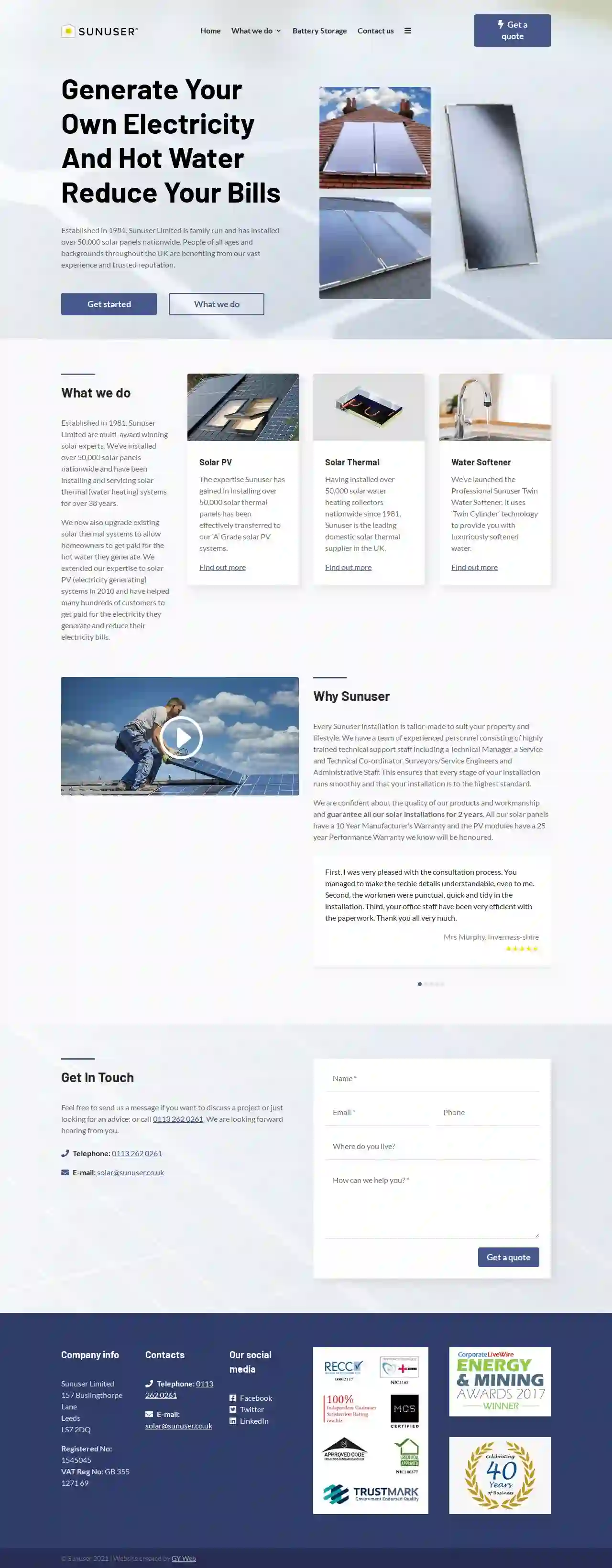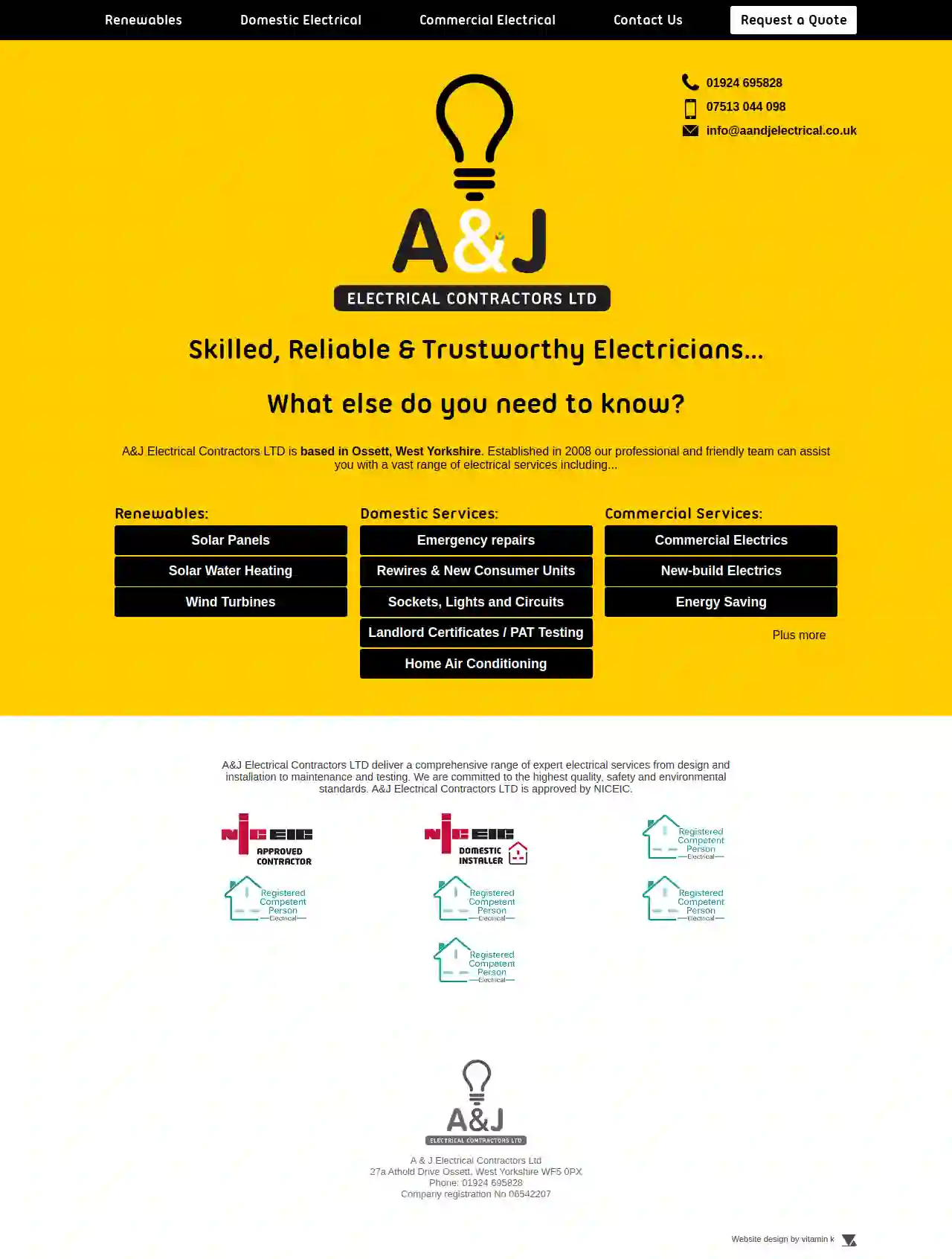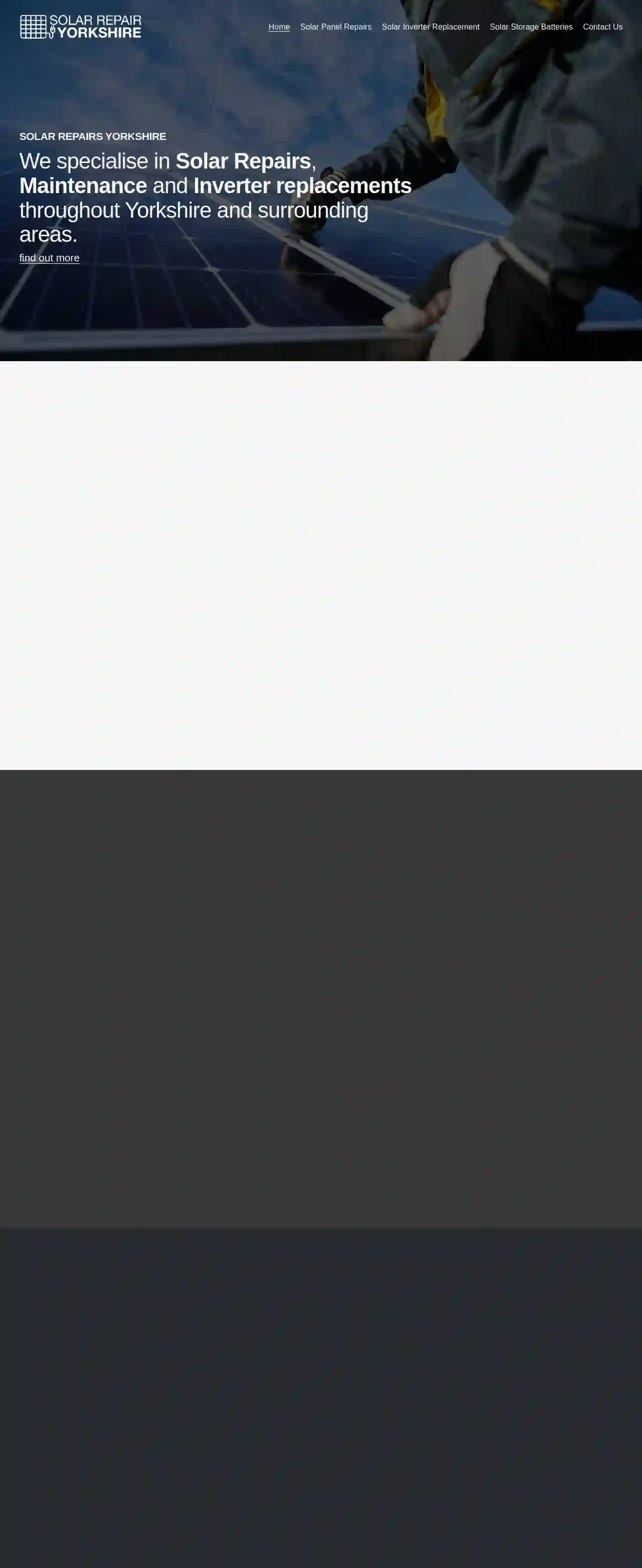Solar Panel Repair & Maintenance York
Best Solar Panel Maintenance in York
Receive up to 3 Solar Maintenance & Repair quotes for your project today! Compare profiles, reviews, accreditations, portfolio, etc... and choose the best deal.

Sunuser Limited
4.322 reviews157 Buslingthorpe Lane, Leeds, LS7 2DQ, GBEstablished in 1981, Sunuser Limited is a family-run, multi-award winning company that has installed over 50,000 solar panels nationwide. We are experts in solar thermal (water heating) systems, having installed them for over 38 years. We also upgrade existing solar thermal systems to allow homeowners to get paid for the hot water they generate. In 2010, we expanded our expertise to solar PV (electricity generating) systems, helping hundreds of customers generate their own electricity and reduce their bills. Every Sunuser installation is tailor-made to suit your property and lifestyle. Our team of experienced personnel includes highly trained technical support staff, a Technical Manager, a Service and Technical Co-ordinator, Surveyors/Service Engineers, and Administrative Staff. This ensures a smooth installation process and the highest quality workmanship. We are confident in the quality of our products and guarantee all our solar installations for 2 years. All our solar panels have a 10 Year Manufacturer’s Warranty and the PV modules have a 25 year Performance Warranty.
- Services
- Why Us?
- Accreditations
- Testimonials
- Gallery
Get Quote
Skylamp Solar
York, GBWelcome to SkylampSolar, the UK's leading provider of solar panels and PV installation. We offer a range of services including solar panel installation, removal, repairs, and servicing & maintenance. Our team of experts can help you get the best system for your needs, whether it's solar thermal, solar PV, or a hybrid setup. We also provide free no-obligation cleaning quotations and a satisfaction guarantee. Contact us today to get a free quote and start making your world eco-friendly.
- Services
- Why Us?
- Testimonials
- Gallery
Get Quote
Solar Fast - Leeds
Unit 17, Allerton Bywater Network Centre, Letchmire Rd, Castleford, WF10 2DB, GBSolar Fast is a trading style of Gas Fast Ltd. Reg No. 05784955. Unit 17, Allerton Bywater Network Centre, Letchmire Rd, Allerton Bywater, Castleford WF10 2DB. We are authorised and regulated by the Financial Conduct Authority FRN 799102. We are a credit broker, not a lender and have facilities with a panel of lenders. Credit is subject to status and affordability.
- Services
- Why Us?
- Gallery
Get Quote
A & J Electrical Contractors Ltd
4.913 reviews27a Athold Drive, Ossett, WF5 0PX, GBSkilled, Reliable & Trustworthy Electricians... What else do you need to know? A&J Electrical Contractors LTD is based in Ossett, West Yorkshire. Established in 2008 our professional and friendly team can assist you with a vast range of electrical services including: Renewables: Solar Panels Solar Water Heating Wind Turbines Domestic Services: Emergency repairs Rewires & New Consumer Units Sockets, Lights and Circuits Landlord Certificates / PAT Testing Home Air Conditioning Commercial Services: Commercial Electrics New-build Electrics Energy Saving Plus more A&J Electrical Contractors LTD deliver a comprehensive range of expert electrical services from design and installation to maintenance and testing. We are committed to the highest quality, safety and environmental standards. A&J Electrical Contractors LTD is approved by NICEIC.
- Services
- Why Us?
- Accreditations
- Gallery
Get Quote
Next Gen Energy
58 reviewsUnit 1, The Old Mill, York YO1 1AA, York, YO1 1AA, GBNext Gen Energy is a Yorkshire-based business dedicated to providing energy and heating solutions for both residential and industrial clients. With over 32 years of combined experience in the electrical industry, owners William Brannon and Alexander Almack are passionate about building a sustainable future, one solar panel at a time. They are MCS accredited Solar PV installers, NIC EIC Approved Contractors, and members of the RECC and TrustMark, ensuring you're in safe hands. All installers are fully qualified, 18th edition trained electricians with BPEC Installation and maintenance of Solar PV qualification. Next Gen Energy prides itself on its transparent approach, with no salespeople visiting your home. To discuss your needs, simply complete the online enquiry form or give them a call. They offer a comprehensive range of services, including residential and commercial solar PV installations, battery storage solutions, EV charging units, electrical contracting, and renewable heating systems.
- Services
- Why Us?
- Accreditations
- Our Team
- Testimonials
- Gallery
Get Quote
SolarVolt
510 reviewsPrinces House, Wright St, Hull, HU2 8HX, GBHere at SolarVolt, we know that renewable electricity can work for everyone. Not only saving you money, but helping to reduce your carbon footprint. We aim to protect your planet, and your pounds! We are Bridlington’s first local renewable energy company and have had the privilege of our quality installation service being featured for all to see on Grand Designs. We are local tradesmen working in the communities we grew up in to provide you with green, renewable technologies to not only save you money but help reduce your carbon footprint. At SolarVolt, quality is paramount. We never use subcontractors, ensuring your project is handled exclusively by our experienced team from start to finish. Solar Volt is your Yorkshire neighbour and your expert for solar and EV charging. We proudly serve our local community with top-quality installations. At Solar Volt, we believe in the power of the personal touch. We take the time to understand your needs and tailor solutions that fit your home or business. We are a team of three experienced, MCS-accredited electricians and roofers who have a combined 20 years of experience in our fields that have come together to offer Yorkshire a cheaper and more sustainable option for their energy supply.
- Services
- Why Us?
- Accreditations
- Our Team
- Testimonials
- Gallery
Get Quote
AEC Solar Division
511 reviewsUnit 10 Pocklington Industrial Estate, Pocklington, YO42 1NP, GBAEC Solar - Your Number One Solar Supplier In North Yorkshire. Working towards a carbon-neutral future. AEC Solar Division Formed From Atkinsons Electrical Contracting Services Ltd, Who Have Expanded Further Into The PV Solar Sector.The Director Robert Atkinson Established The Business In 2008. His Extensive Knowledge In The Sector Stems Back To When He Left School And Started His Electrical Installation Apprenticeship. He Has Been Involved In PV Solar Since 2010. Over the years the company has gone from strength to strength, by building trusted working relationships with local businesses and residents who continue to be valued customers.With our combined knowledge of Electrical Installation and PV Solar, it is hard to find another installation team that will deliver a better, more efficient job in any type of project, whether it be a new build project or upgrade to your property. We continue to evolve with this fast-paced industry to give you the best service and products.
- Services
- Why Us?
- Accreditations
- Our Team
- Testimonials
- Gallery
Get Quote
UKSOL Ltd.
55 reviewsGBUKSOL is the leading provider of solar modules for ECO4 funded projects. Britain’s leading solar PV panel exporter. UKSOL produces high quality solar PV modules with a 30 year warranty. UKSOL exports globally. UKSOL Ltd. is a British solar PV panel producer based in Bucks since 2015. UKSOL solar panels are MCS, TUV/IEC, WEEE compliant. UKSOL offers a wide range of affordable, high-quality, half-cell, P & N-Type solar cells and bifacial modules that are backed by a trustworthy 30 year British warranty. UKSOL is an Export Champion for the British Government because we sell into over 50 countries worldwide. Ofgem has approved UKSOL’s optimised solar module as an Innovation Measure for ECO funding with a 45% uplift.
- Services
- Why Us?
- Accreditations
- Gallery
Get Quote
Solar Repairs Yorkshire
York, GBWe specialise in Solar Repairs, Maintenance and Inverter replacements throughout Yorkshire and surrounding areas. We’re passionate about solar and we’ve been installing and repairing solar systems for over a decade throughout the Yorkshire area. Today we focus on solar repairs, battery storage and off grid power systems for properties not connected to the nation grid. Our off grid systems are reliable, effective and cover all applications from camper vans to allotments through to full off grid houses like our own. If your interested in any of the above, then please get in touch.
- Services
- Why Us?
- Gallery
Get Quote
Solar Fast
4.8225 reviewsLetchmire Road, Unit 17, Allerton Bywater Network Centre, Castleford, WF10 2DB, GBSolar Fast is a UK-based solar energy company dedicated to providing expert customer support throughout the country. Their team of fully trained professionals, based in Yorkshire, is committed to resolving customer queries efficiently. Whether it's a simple question or a complex issue, customers can expect personalized assistance from the Solar Fast team, including access to senior staff if needed. The company emphasizes transparency and direct communication, ensuring customers always speak to real representatives, not call centers.
- Services
- Why Us?
- Gallery
Get Quote
Over 3,485+ Solar Companies on our directory
Our solar experts operate in York and surroundings!
SolarCompaniesHub has curated and vetted Top Solar Installers near York. Find a top & trustworthy contractor today.
Solar Panel Repair & Maintenance FAQ
- Increased Energy Efficiency: Clean and well-maintained panels produce more energy, maximizing your solar savings.
- Extended System Lifespan: Regular inspections and timely repairs can prevent minor problems from escalating into major issues, prolonging the lifespan of your solar system.
- Reduced Repair Costs: Catching problems early can prevent more extensive and costly repairs down the line.
- Improved Safety: Maintenance checks can identify potential electrical or fire hazards, keeping your system safe.
- Warranty Compliance: Some solar panel warranties require regular maintenance to remain valid.
- Panel Replacement: Replacing a single damaged panel can cost [estimated range].
- Inverter Repair or Replacement: Repairing or replacing an inverter can cost [estimated range].
- Wiring Repair: Fixing faulty wiring connections typically costs [estimated range].
- Troubleshooting and Diagnostics: The cost for a professional to diagnose the problem can range from [estimated range].
Do solar panels work in the winter or on cloudy days?
What are the benefits of regular solar panel maintenance?
How much does it cost to repair solar panels?
What are the different types of solar panel warranties?
Product Warranty: This warranty covers defects in materials and workmanship for a specified period, typically 10-25 years. It ensures that the panels will be free from manufacturing defects that affect their performance.
Performance Warranty: This warranty guarantees a minimum level of power output from the panels over a specified period, usually 25 years. It ensures that the panels will maintain a certain level of efficiency over their lifetime.
The length and coverage of these warranties can vary by manufacturer and panel type. It's important to review the warranty details carefully before purchasing panels.
Do solar panels work in the winter or on cloudy days?
What are the benefits of regular solar panel maintenance?
- Increased Energy Efficiency: Clean and well-maintained panels produce more energy, maximizing your solar savings.
- Extended System Lifespan: Regular inspections and timely repairs can prevent minor problems from escalating into major issues, prolonging the lifespan of your solar system.
- Reduced Repair Costs: Catching problems early can prevent more extensive and costly repairs down the line.
- Improved Safety: Maintenance checks can identify potential electrical or fire hazards, keeping your system safe.
- Warranty Compliance: Some solar panel warranties require regular maintenance to remain valid.
How much does it cost to repair solar panels?
- Panel Replacement: Replacing a single damaged panel can cost [estimated range].
- Inverter Repair or Replacement: Repairing or replacing an inverter can cost [estimated range].
- Wiring Repair: Fixing faulty wiring connections typically costs [estimated range].
- Troubleshooting and Diagnostics: The cost for a professional to diagnose the problem can range from [estimated range].
What are the different types of solar panel warranties?
Product Warranty: This warranty covers defects in materials and workmanship for a specified period, typically 10-25 years. It ensures that the panels will be free from manufacturing defects that affect their performance.
Performance Warranty: This warranty guarantees a minimum level of power output from the panels over a specified period, usually 25 years. It ensures that the panels will maintain a certain level of efficiency over their lifetime.
The length and coverage of these warranties can vary by manufacturer and panel type. It's important to review the warranty details carefully before purchasing panels.